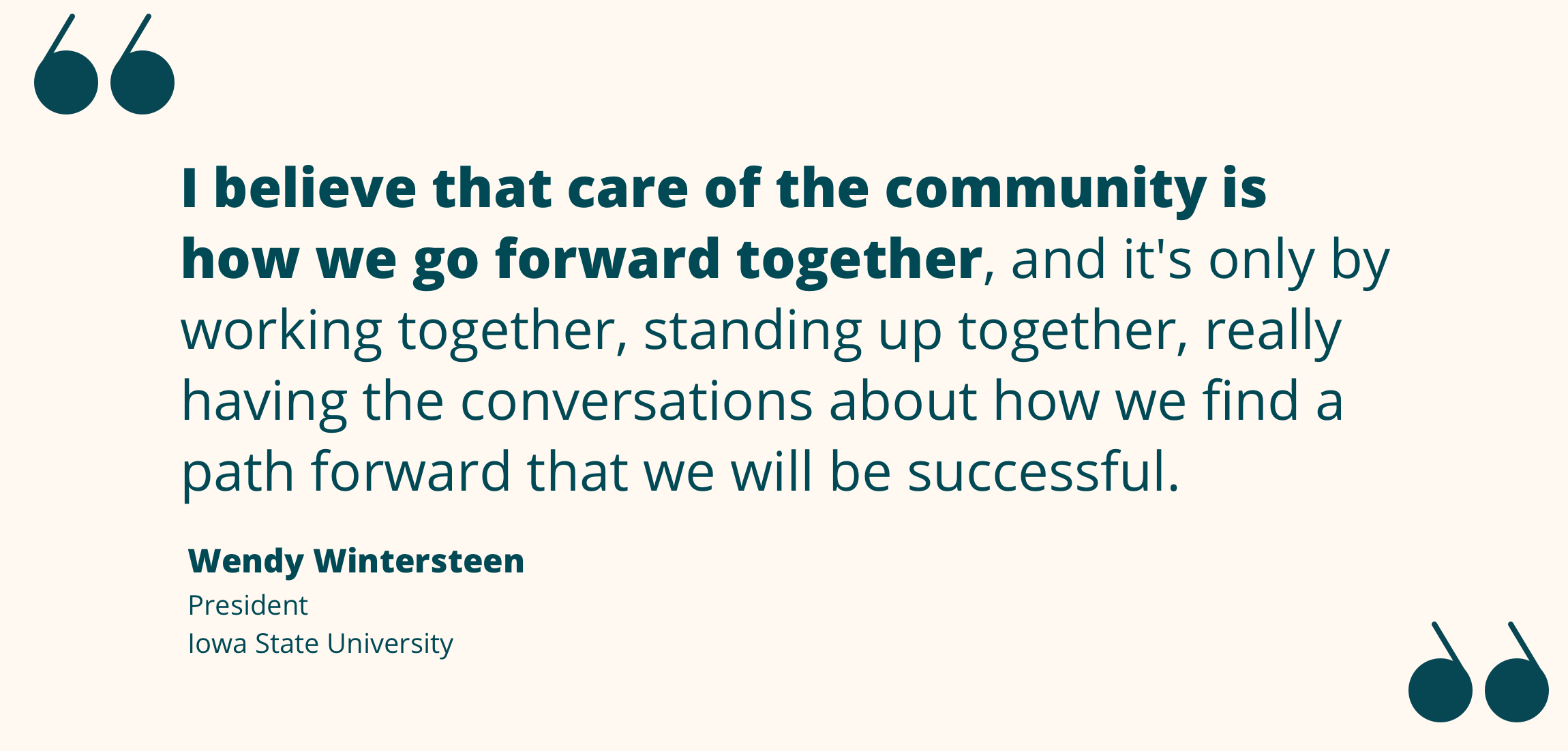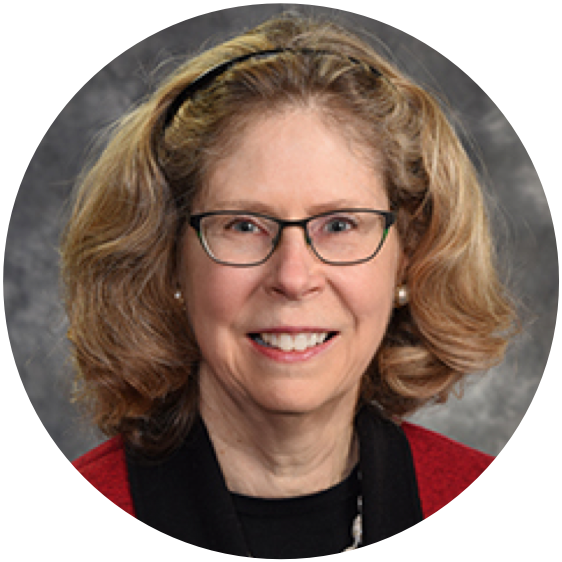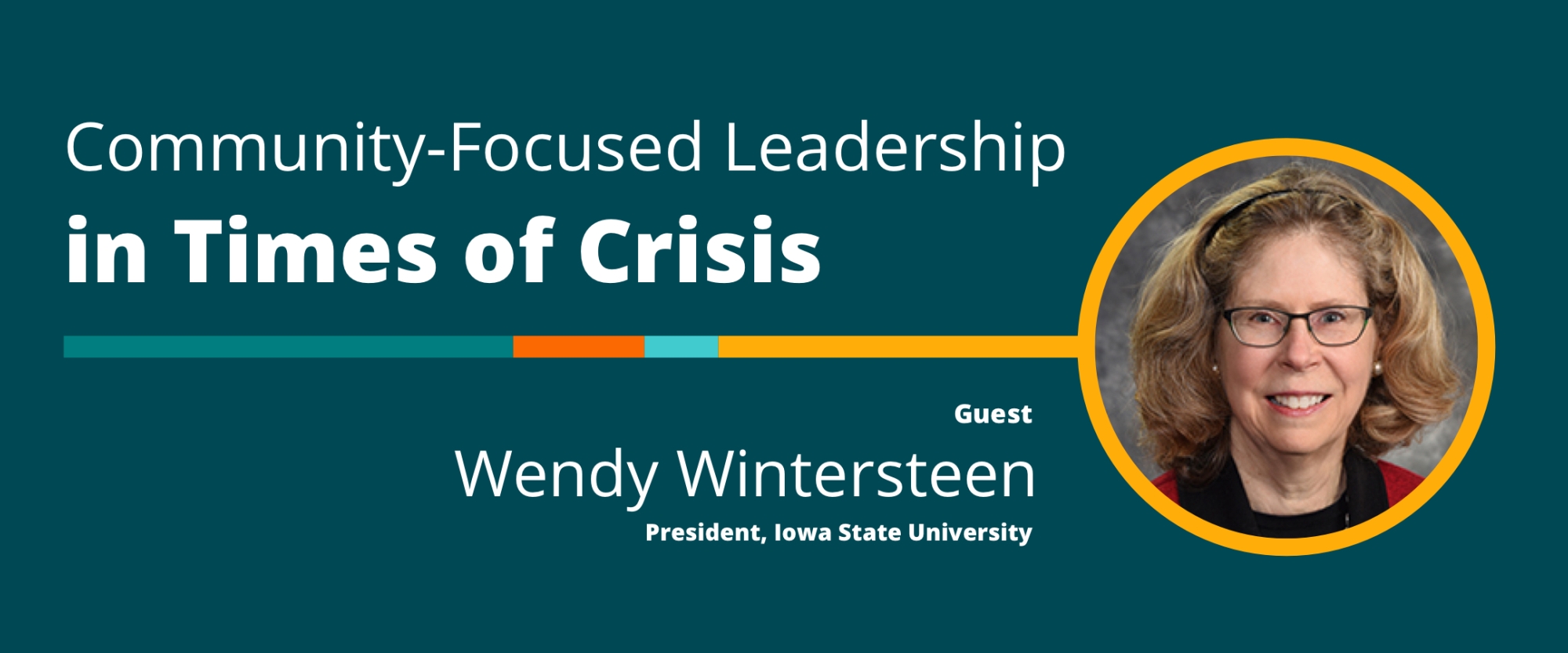Note: This interview originally aired on April 27, 2020 as part of the University Innovation Alliance’s Weekly Wisdom Series that airs live on Facebook, Twitter, and LinkedIn.
The University Innovation Alliance created the Weekly Wisdom podcast series, in partnership with Inside Higher Ed, to spotlight leaders in higher ed and hear their thoughts on how they keep their colleges and universities operating during the COVID-19 pandemic. I'm the Executive Director of the UIA, and my co-host for these podcasts is Jeff Selingo, author, journalist, and special advisor at Arizona State University. In our third Weekly Wisdom conversation, we spoke with Dr. Wendy Wintersteen, the first female president of Iowa State University and the former endowed dean of Iowa State’s College of Agriculture and Life Sciences. For the leader of such a large institution, President Wintersteen is refreshingly humble and open, willing to share with and listen to her community while continuing the university's mission of innovation. Rather than simply adopting humility and transparency as best practices during the pandemic, these qualities characterize her approach throughout her 40 years at Iowa State. Let's delve into the calm, inspiring wisdom that she shared with us.
Keep Innovating!
President Wintersteen is all about innovation. In fact, she began our conversation with her take on a quote from Winston Churchill: "'When you're going through hell, keep on going.' But I've been saying we need to revise that phrase to read: 'When you're going through hell, keep innovating.'" Indeed, Iowa State's new brand is Innovate at Iowa State, and the new Student Innovation Center had been scheduled to open in April 2020 if not for the COVID-19 pandemic. "It's disappointing that we didn't get to do that," she admitted. "But innovation is going to be the key at Iowa State not only in dealing with this crisis, but also in how we go forward into the future. It's truly how we operate."
Community-Focused Leadership
During this challenging time, President Wintersteen draws from the examples set by other college leaders throughout the country, adding, "Sometimes it speaks so clearly to our own experience that it's nice to be able to share that approach, share that quote, and realize that we're all in a big community." Emphasizing the importance of human connection at Iowa State, she explained, "I believe that care of the community is how we go forward together. So by being able to reach out and thank a family member for the good work that they are doing, thank a student for something that they have been able to achieve in this difficult time, that really demonstrates to me that we are part of a community, and it's only by working together, standing up together, really having the conversations about how we find a path forward that we will be successful."

With 40 years of experience at Iowa State, including staff and faculty positions, President Wintersteen has seen a number of crises. "As a brand new extension staff member, way back in the 1970s and '80s, I watched Iowa and the nation go through the Farm Crisis," she recalled. "And I really saw what it meant to be part of a community that was deeply engaged in helping farmers all over the state respond to the crisis, to come up with new approaches, new opportunities, new ways to move forward. Giving up wasn't part of the calculation or equation. That taught me how important community is, how important good communication is, how important it is to build relationships of trust so that you could work together."
Transparency and Empathy
President Wintersteen's communication philosophy is that the process must lead to transparency. For example, she told us that while it was painful to reveal how the COVID-19 pandemic has cost the school more than $80 million, "We talked about what reduced enrollment will mean for Iowa State University in the fall, and discussed the fact that we are implementing budget reductions all across the university, and what was our philosophy behind that approach, and how those budget reductions would be implemented through the different divisions. So I think transparency is key."
Again, she stressed the importance of empathy "so that the community knows that you know how hard they are working." She clarified, "You realize that faculty that get their energy literally from being in a classroom with students are desperately missing the students, and the same is true for the students that know their faculty. So trying to give that message of care and concern and a sense that you have some understanding of what they're going through, I think, is critically important during a crisis." While the demands of this challenging year are keeping everyone busy, there's no way it can be business as usual, and expectations have to be adjusted. "It is a different world," President Wintersteen admitted, "and I think the message has been heard that we in the university leadership understand that it is a different world and that we are taking that into consideration."
Silver Linings for the Future
Despite these setbacks and adjustments, President Wintersteen foresees several positive changes to higher education as a result of the pandemic. One is the flipped classroom model, in which the lecture happens online and "in the classroom time when you're together, it's really about discussion and an opportunity to engage the students with each other and with a faculty member," she said. "So this idea of how we use technology to develop a better educational experience for our students, I think that's gonna stick."
She also foresees more online offerings, noting that earlier this year Iowa State put 6000 courses online within the space of one week. She told us, "Faculty will see that this is an area that they will want to be more involved in for the future, but in a more planned, comprehensive way than having a week to prepare." However, this won't replace live instruction and in-person community. "There is a deep desire from the students that come to Iowa State University to have the residential campus experience," she said. "I have students tell me over and over again that they can't wait to be back on our beautiful campus, to be experiencing the times that they have with their fellow students." She described a recent student survey in which "98 percent of the respondents said that they were staying in contact with their classmates. And I think it shows the need for this human connection that we all have."
Like any good leader, President Wintersteen won't forget the most obvious lesson from this crisis: "We have to be more prepared in the future for different types of crises to occur and what does it look like to be more nimble and flexible in how we work."
Service and Effectiveness
Along with drawing inspiration from the positive examples of other college leaders and the determined spirit of the Iowa State University community, President Wintersteen told us about her two favorite leadership books. From The Servant Leader by James Autry, she's learned that "you have to bring your spirituality to work, that it really is about being present, being useful, being authentic to who you are, being vulnerable." She added, "It's not about being in charge; it's about building a team and creating an environment where they can all work successfully." She's taken this book to heart, using it as a theme for her installation as president and displaying the words "To Serve" on her car's license plate.
More recently, she discovered The Effective Executive by Peter Drucker, whose message she summarized: "It doesn't matter how good your intellectual capacity is or how talented and skilled you are as an administrator. If you're not effective, then you aren't going to have the impact that you desire to have, and that a lot of it comes down to how you spend your time." She also likes The Daily Drucker, a later work in which the author reinforces his philosophy with practical tasks, and she gave us this example: "At the end of the week, you should give yourself a report card on four skills: listening, communicating, re-engineering mistakes, and subordinating your ego to the task at hand."
We were inspired by President Wintersteen's emphasis on innovation, empathy, and service, critical skills for the toolbox of any school leader hoping to successfully navigate the unknowns of this pandemic.
Links Mentioned in This Episode
• Innovate at Iowa State
• Farm Crisis
• flipped classroom
• The Servant Leader
• The Effective Executive
• The Daily Drucker
Bios of Guest and Co-Hosts

Guest: Wendy Wintersteen, President, Iowa State University
Dr. Wendy Wintersteen serves as Iowa State University's 16th president, the first woman in the university’s history to hold that office. She was previously dean of the College of Agriculture and Life Sciences (the first endowed deanship) and director of the Iowa Agriculture and Home Economics Experiment Station. During her tenure, Agriculture and Life Sciences was ranked in the top ten globally, experienced record enrollment growth, established innovative teaching partnerships, expanded student entrepreneurship opportunities, enhanced diversity and inclusion efforts, raised nearly $250 million in private support, and completed several major building projects. Her career at Iowa State spans nearly 40 years, beginning as an extension specialist in integrated pest management. After completing her doctorate, she served as a professor of entomology with a brief stint in Washington D.C., and in administrative roles in extension and the College of Agriculture and Life Sciences. Dr. Wintersteen represents Iowa State University on many state, national, and international boards. In 2013, she was appointed to the U.S.-Israel Binational Agricultural Research and Development Fund board of directors. She was the 2016 recipient of the Carl F. Hertz Distinguished Service to Agriculture Award from the American Society of Farm Managers and Rural Appraisers. Dr. Wintersteen earned her B.S. in agriculture from Kansas State University and her Ph.D. in entomology from Iowa State University. In 2007 she was honored as a Kansas State University Alumni Fellow for professional accomplishments and distinguished service.

Co-Host: Bridget Burns, Executive Director, University Innovation Alliance
Dr. Bridget Burns is the founding Executive Director of the University Innovation Alliance (UIA). For the past decade, she has advised university presidents, system chancellors, and state and federal policy leaders on strategies to expand access to higher education, address costs, and promote completion for students of all backgrounds. The UIA was developed during Bridget’s tenure as an American Council on Education (ACE) Fellowship at Arizona State University. She held multiple roles within the Oregon University System, including serving as Chief of Staff and Senior Policy Advisor, where she won the national award for innovation in higher education government relations. She was a National Associate for the National Center for Public Policy and Higher Education, and has served on several statewide governing boards including ones governing higher education institutions, financial aid policy, and policy areas impacting children and families.

Co-Host: Jeff Selingo, author, journalist, special advisor at Arizona State University
Jeff Selingo is an author, a journalist, and a special advisor at Arizona State University. He has written about higher education for more than two decades and is a New York Times bestselling author of three books. His latest book, Who Gets In & Why: A Year Inside College Admissions, was published in September 2020 and was named an Editors’ Choice by the New York Times Book Review. A regular contributor to The Atlantic, Jeff is a special advisor for innovation and professor of practice at Arizona State University. He also co-hosts the podcast, FutureU. He lives in Washington, DC with his family.
About Weekly Wisdom
Weekly Wisdom is an event series that happens live on Facebook, Twitter, and LinkedIn. It also becomes a podcast episode. Every week, we join forces with Inside Higher Ed and talk with a sitting college president or chancellor about how they're specifically navigating the challenges of this moment. These conversations will be filled with practicable things you can do right now by unpacking how and why college leaders are making decisions within higher education. Hopefully, these episodes will also leave you with a sense of optimism and a bit of inspiration.
Rate, Review & Subscribe
Learn why hundreds of people have rated this new podcast 5 stars! Please join others and rate and review this podcast. This helps us reach and inform more people -- like you -- to help increase the number and diversity of college graduates in the United States.
Click here, scroll to the bottom, tap to rate with five stars, and select “Write a Review.” Then be sure to let us know what you loved most about the episode! Also, if you haven’t done so already, subscribe to the podcast. We’ll be adding a bunch of bonus episodes to the feed and, if you’re not subscribed, there’s a good chance you’ll miss out.

